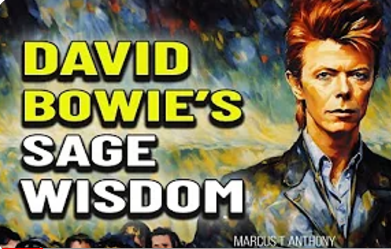The mind has a tendency to ruminate on problems, issues and especially grievances. In the Digital Age, where clickbait news and social media feeds are assaulting your amygdala on a moment to moment basis, trying frantically to get you to bring your attention to their causes and invest emotional energy in them, it has become more important than ever to be able to spot rumination spaces within your mind and to deactivate them as quickly as possible. A simple but effective tool I developed called “Countdowns” can be used to counter this problem. Countdowns are a simple tool that will quickly quieten the mind, and bring your attention back to the present moment, or to whatever focus you prefer.
The purpose of Countdowns is not necessarily to eliminate reflective thinking, although returning to silent, embodied presence may be the best option in any given situation. Alternatively, you may wish to take more control of the mind, and to focus on something more important. Rumination is typically upon subject matters that serve little purpose, or are perhaps completely pointless. At worst they keep us trapped in drama and conflict with others. In other words, rumination is disempowering. You cannot stand in your power if you do not have rumination in check.
There are obviously life problems and situations that require focussed or even urgent attention, but much rumination is simply not necessary, representing on-going inner babble, a running background TV commentary that serves little purpose other than to fill your mental living room with pointless noise.
You can think of rumination spaces as those bubbles of emotional projection that you regularly return to in your thinking, where you repeat the same topic over and over again in your mind. Quite commonly they involve an imagined opponent, a person or people who are bad and wrong, and who have to be silenced and/or defeated. These might include your political or tribal opponents, the president or prime minister, your partner, your friends, the boss, your work colleagues and professional competitors and so on.
This strong tendency of the mind towards rumination is today a far bigger challenge than it was for mindfulness practitioners of yesteryear. The Buddha didn’t have to struggle with a daily dose of Twitterous twits constantly attempting to trigger him into emotional reaction. Lao Zi’s attention was most likely inward much of the time, aligned with the Dao, not battling opponents on Reddit. The ancient Chinese sage was quite happy to permit the dramas of king and courtiers to carry on as preferred. And Christ’s daily prayer sessions were not interrupted by smart phone alerts, notifying him to the urgent “breaking news” that he just had to read in order to stay informed and on top of his game.

Rumination has two common drivers. The first is simply the mind’s attempt to stay relevant, to ensure its continued existence. The drama that is entailed in rumination achieves that job nicely. There is a threat or an opponent that just has to be dealt with, or at the very least a serious problem that has to be solved. And we can’t just let that be, right? It’s too urgent.
For the mind, silence equals loss of control, and ultimately death.
The second driver is your story, and that story in turn probably emerges from your original pain. Rumination is often triggered by an external event which mirrors your story and its embedded beliefs, activating your emotional body. That means an instant upload of the usual emotional cocktail: any combination of fear, anger, guilt, shame and perhaps grief. The Countdown tool I share below is therefore best used in combination with some of the healing tools I outline elsewhere in this book. Countdowns won’t heal you by themselves. But if done with strong intention, they will pull you out of the drama and return you to the present moment, where you can focus on whatever is of greater value to your Authentic Self (including healing, if you wish).
Countdowns are simple. Whenever you catch yourself ruminating over someone or something, stop, still yourself, and count down from three to zero, focussing you’re your breath and counting one time on each exhalation. When you reach zero, affirm: “I choose peace.”
But you will likely find that it won’t end there. The mind is a field of habits, and the same subject of rumination will probably appear again within short time. It is important not to judge yourself at this point. It is normal to feel some frustration when we encounter resistance from the mind. But that resistance is perfectly normal. So, each time a ruminating thought or drama enters the mind, simply gently notice it, and repeat the countdown; only this time with a single difference. Add one more breath, counting from four to zero. Continue with this process throughout the day. Each time you find yourself ruminating on the undesirable topic(s), add one more breath to the countdown. I call these expanding countdowns.
The key here is your intention. But intention is a bit of a chicken and egg situation. First you must have a certain degree of intention and set the action in place (countdowns). However, that action also helps reinforce your intention. As you become better at mental self-control, your sense of agency will increase, along with your sense of self-empowerment.
I personally like to use two forms of countdowns. I use the expanding countdowns for targeted dramas. These are the topics that I consider to be most wasteful of time and attention, and most disempowering. Amongst these I include anything to do with differences of opinion on politics, religion, science and so on, or any argument or dispute I might have participated in with a work colleague or administrator, or with a friend or family member.
For other less “serious” thought patterns, those which have little emotional power over me, I usually just use three breaths in the countdown, and I find that to be sufficient. The subject matters here might be everyday things like thinking about news stories and current events, my next workout, what I am writing about in this book and so on.
Therefore, whether I use the expanding countdown or the three-breaths countdown simply depends on the emotional investment my mind has on the topic at hand. I use the expfgvtttttttttttttttttttanding countdown for more serious or lingering ruminations which require attention and self-discipline.
When I first used this mindfulness tool, I sometimes got onto the twenties with my countdowns. That was a little frustrating at times, but I released all judgment and gently but purposefully persisted. After some days the countdowns became less common, and the ruminations began to drop away.
Still, I personally find that during times of greater psychological challenge, the need for deliberate use of mindfulness tools like these increases. But the best part is that they are simple, and once you learn them they will always be with you.
This article is a excerpt from Marcus T Anthony’s upcoming book, Power and Presence: Reclaiming Your Authentic Self in a Weaponized World.







